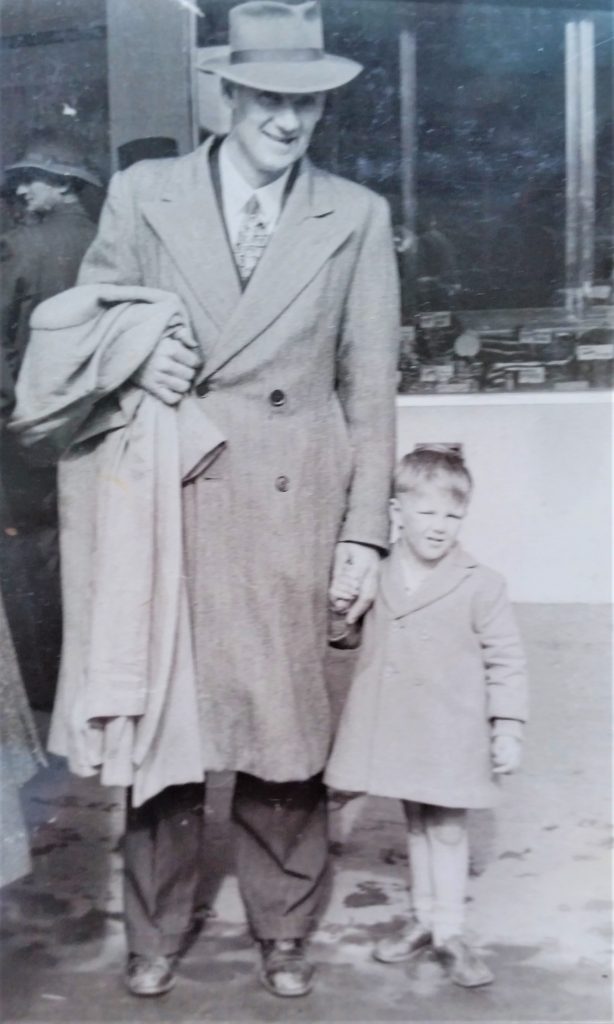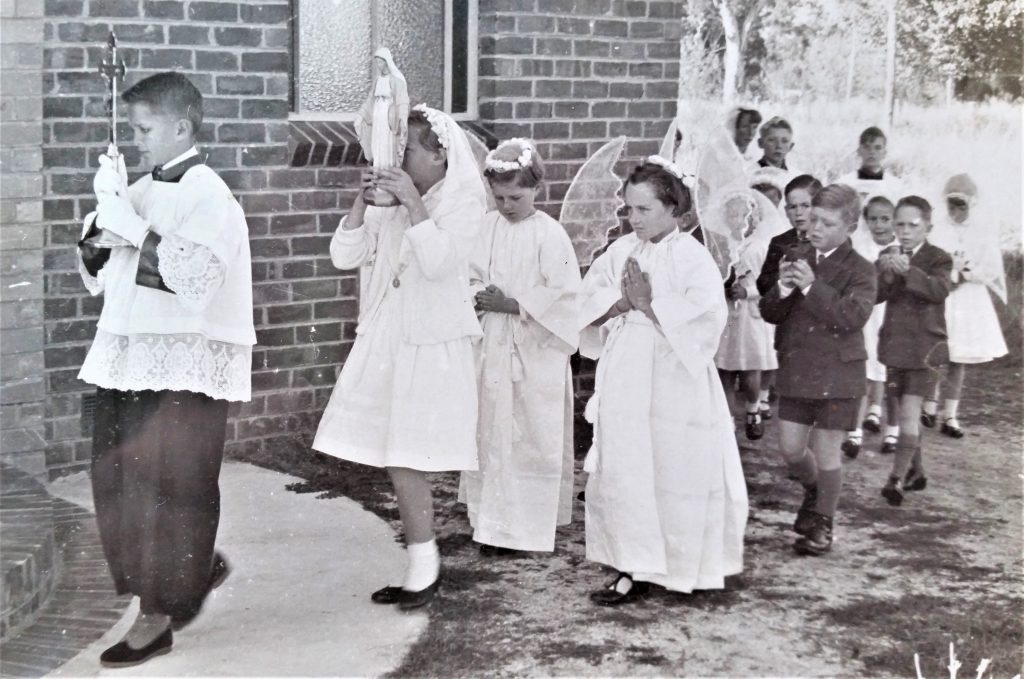Growing up in a Catholic Family was the dynamic exerting most influence upon my childhood. Being a Catholic for me was going to a Catholic School run by the Sisters of Mercy, going to Mass on Sunday and being an Altar Boy, saying the Rosary every night, knowing the Ten Commandments off by heart, being lined up to go to Confession while at school and singing the hymn to Mary, “Hail Queen of Heaven.” Up to the early 1960s the Mass was in Latin and the Priest officiated with his back to the people. Not to forget, no meat on Friday and fasting from the night before if you wanted to receive Communion at Mass.
All of this was in the context of a happy family atmosphere at home, on the farm, so the experience was not negative at the time. It was only in later years I came to realize how constricted a religious upbringing this was. At core, there were no Scriptures, there was no Bible in the house. Dad distrusted the Bible, or more accurately distrusted the reading of such through fear of wrong interpretation: the carry-over of sectarian Christianity, because reading the Bible is what “got the Protestants onto the wrong track.”
It was not just that Catholics were not encouraged to think for themselves regarding faith, they were forbidden to think for themselves. Clericalism at its worst. The catechesis was so restrictive and constrictive, linked to moral imperatives, formal ritual and pious practice. Such a narrow perspective of Christian life and faith would have serious consequences when all the rules changed following the Second Vatican Council. That is a story for another day.
Granny – Dad’s mother – was an enforcer of our catholicity and a pivotal person in our life in general. Diminutive in stature she was a giant in toiling and caring for her family. She did this on her own as her husband died in 1939. As kids we never knew our grandfather. After Sunday Mass there was always a breakfast of sausages and mince on toast at her likewise diminutive cottage at Hovell Street Howlong, which nestled upon the Murray River downstream from Albury. Granny was a daily-Mass goer and even heaven would not help you if you forgot your rosary beads, used bad language or told a lie.
Catholic politics in the post-war period was dominated by anti-communism and its prophet in the person of B.A. Santamaria. It occurred to me that Bob was so self-assured, so arrogant in his perspective, that he did not need assurance from anybody, even God. However, to so many Catholics in that part of the world – particularly in the farming community – Bob was indeed a spokesperson of God. Socially conservative and Traditionalist to the hilt as a Catholic, he wielded great power within our family and that of the local catholic community. Aside from forming the Democratic Labour Party (DLP) and so splitting the Labour Party, Bob founded the National Civic Council and edited its publication News Weekly; both it and his weekly broadcasts were waited upon more than the Sunday readings of the Gospel. In later years following the Second Vatican Council Bob Santamaria produced the magazine AD 2000 to air his opposition to any changes in the Church. It carried much more weight than did the Bible.

Whatever of Dad’s attitude toward the Bible and his adherence to the script of B.A. Santamaria, his fundamental impact upon me as a boy was his steadfastness, his stability, his presence. He was as honest as the day is long, with no duplicity in any way. He was my rock.
An incidence I will never forget. I was bullied by the “town boys” after school in grade 6, forcing me into a fight. I wanted Dad to intervene. He said “If I step in it will only make matters worse. Next time, when they push you into a fight, immediately hit him hard with your fist on the nose. They will leave you alone after that.” And they did.
There were other Catholic influences in our family. Dad’s brother, second youngest in a family of seven, was a Priest. In true Irish-Catholic tradition, Granny had always prayed for one of her sons to be a Priest. The first four, including Dad, did not answer her prayer, so it was left to Joseph as the last remaining son to respond. On Mum’s side, three of her sisters were Sisters of Mercy and two of her nieces also joined the Religious Order.

I was always going to be a Priest. That is, a Redemptorist Priest. (Redemptorists being one of the many missionary Congregations of the Catholic Church). From around age 10 or 11 I recall speaking about this, no doubt after a Redemptorist Priest conducted a “mission” in the Howlong Parish. This consciousness remained with me through High School in Queensland, even though I had no further contact with any Redemptorists. I essentially recruited myself into that Congregation.
Obviously and naturally, the factors and influences mentioned above were dominant in my decision.
There is a line in Catholic theology that entry to Priesthood is a “divinely inspired call”. This has validity for an older person who undergoes a process of self-searching, is genuinely facing various options in life and has a level of self-knowledge and mature faith. But for a young lad in elementary school surrounded by strong Catholic “ties”?
This reality has never concerned me. The process of study and religious formation I undertook with the Redemptorists covered a total period of eight years; over that period my decision was constantly reaffirmed and verified. Not only by myself, but by my colleagues and by my superiors. Likewise, during the sixteen years of priesthood in the Philippines, the correctness of my decision and the validity of my ministry was reaffirmed and verified.
A footnote
I never chose to leave the priesthood, rather I chose to have a family and accepted the consequences of that decision: having to leave the formal community of Redemptorists and being unable to continue the ministry of priesthood.
Some years later, while active in our local church community in Rockhampton, a long-time stalwart of the catholic church spoke to me. She said: “Tony, I have been a member of this church for over 80 years. I think you should still be allowed to be a priest.” I agree with her.